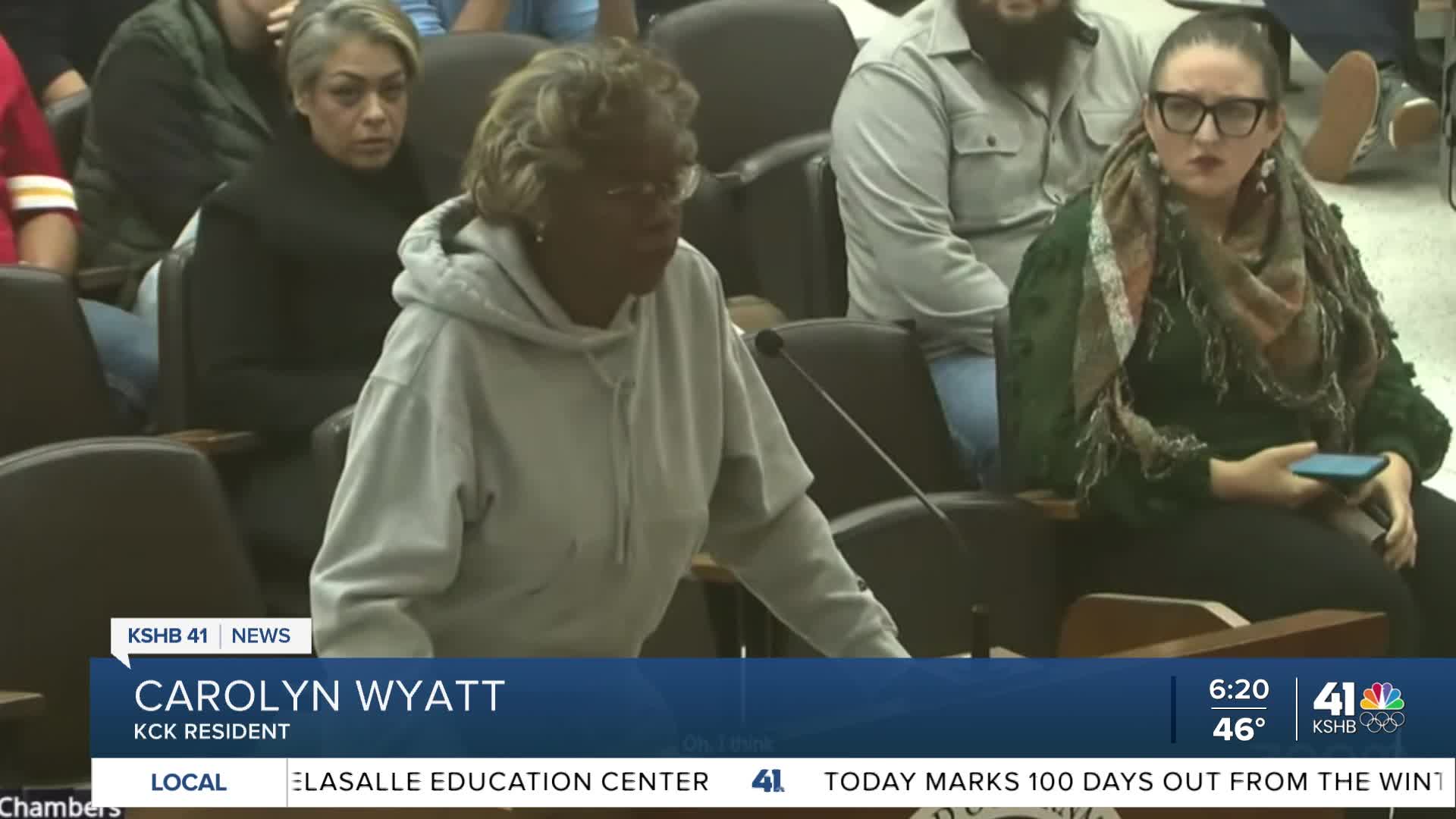KSHB 41 reporter Rachel Henderson covers neighborhoods in Wyandotte and Leavenworth counties. Share your story idea with Rachel.
—
Wyandotte County residents attended a standing committee meeting Monday night to debate whether Unified Government employees should be required to live within the county or if that requirement should be expanded to a 30-mile radius of City Hall.
The Administration and Human Services Committee discussed proposed resolutions that would change the current residency requirement from living within Wyandotte County to living within 30 miles of City Hall.
One of the resolutions under the agenda item also would extend the time frame for establishing residency from one year to two years.

A 30-mile radius would include cities in both Kansas and Missouri, such as Olathe and Parkville.
All elected officials and personnel in the Unified Government of Wyandotte County/Kansas City, Kansas currently must live in the county.
The committee, chaired by Melissa Bynum and including Commissioners Mike Kane, Christian Ramirez, Andrew Davis and Evelyn Hill, ultimately voted to table the issue until the next meeting on Nov. 17.
The agenda item came from an HR recommendation, and the mayor and county administrator approved for it to be on the committee agenda.
The mayor put out a public poll on the topic back in February.
Commissioners Chuck Stites and Tom Burroughs participated via Zoom and expressed support for lifting the requirement, with Stites mentioning he wanted to see more explicit requirements for the county administrator to live in Wyandotte County.
Kane — who also attended via Zoom — made motions to table the discussion both at the beginning and end of the 1.5-hour debate.
Ramirez eventually seconded the motion virtually.
"The whole community has not spoken," Ramirez said in reference to the majority of attendees being in favor of the residency requirement being lifted.
Both commissioners said they favor the current residency requirement.
"I don't want to lift it either," Kane said, who questioned the overall timing of the agenda item.
Kane's reasoning was that new commissioners and a new mayor will take office after November 4th's general election but won't be sworn in until December 15.
The clerk shared that the last commission meeting of the year is scheduled for December 18 after Commissioner Evelyn Hill inquired about the timeline for newly-elected officials.
Even with an entirely new group of elected officials, the majority of commissioners would still be pre-existing.
The legal department told commissioners they had 30 days to act on the item after tabling it.
"There are a lot of folks that feel differently," Davis said, also in reference to the majority of votes in favor of item 4.6.
He was also critical of the data presented and said it seemed to favor lifting the residency requirement.
“I think it's always good to play devil's advocate…tell the full story,” Davis said.
However, other commissioners expressed different views about taking action Monday.
"We're here now, let's address it," Stites said.
Legal representatives said these are operational issues that cannot be placed on a ballot.
Several dozen people attended the meeting in person, and about 80 written comments were submitted in favor of lifting the residency requirement.
"I'm against lifting the resident policy. I think 30 miles is a long way," said Carolyn Wyatt, a Kansas City, Kansas resident.

The Unified Government's Human Resources Manager Shakeva Christian said the current requirement has deterred people from applying for positions.
"They have a lack of individuals that are interested because of the residency," Christian said.

Christian shared data from a survey of 16 surrounding cities and counties that responded to the UG’s request.
The Kansas City Board of Police Commissioners relaxed its requirements for Kansas City, Missouri Police Department staff in 2022 to allow them to live up to 30 miles outside the city limits.
Seven had no residency requirement, while others had specific rules for roles like city manager or public safety positions.
Christian also presented a pie chart from a 2022 community survey showing 30% strongly support a residency requirement, 33% do not support or strongly oppose it, 18% were neutral and 20% somewhat support it.

Steve Sessions, who runs a Facebook group called "We the People of WyCo" dedicated to informing Wyandotte County residents, supports lifting the requirements.
"We have to make sure that we are able to hire the best. Not just the best of what's in our county, but the best that will serve our county," Sessions said.
Sessions said his group researched the issue extensively.
"We dug around to the other cities, we dug around to the other counties. We called people within our city. We talked to people that have retired from our city," Sessions said. "The whole purpose isn't allowing people to move away, it's allowing us to hire from people that don't live here.”
He says expanding the applicant pool can help address other pressing issues in the county, like government efficiency.
"To limit ourselves to only who is either living here or willing to uproot and move here is, I mean, it's not feasible. It's not realistic," Sessions said. "Just because they happen to work somewhere doesn't necessarily mean that is where their family dynamic fits in.”
Sessions criticized the committee's decision to table the issue in-person and again on Tuesday.
"It's concerning that that is what happened last night, that they can't even make a judgement when it's their job to make a judgement call," Sessions said.

Dr. Susan Keim, an associate professor of public administration at Park University, discussed the pros and cons of residency requirements during the meeting.
Keim worked in Wyandotte County for 20 years and is familiar with the county’s dynamic.
"The residency requirement has been a topic of conversation for years," Keim said, and mentioned how the city and county procedures were split before consolidation almost 30 years ago.
She outlined several benefits of requiring local residency.
"The community connections I think are the most important that if you live in a community, then you are more invested in what happens in the community and the laws in the community and your general welfare," Keim said. "People would buy their home there, they'd shop there. Kids would go to school there. Some people think that there would also be higher productivity, meaning that if you live in the community you work in, you might be more likely to do your best," Keim said.
However, Keim also noted arguments against residency requirements.
"The idea of personal freedom. I want to live where I want to live and I want to work where I want to work," Keim said.
She cautioned that statistics only tell part of the story.
"Each city would have different issues, and they may not be able to generalize it," Keim said.
Currently, vacancies exist in public safety departments like fire and the sheriff’s office.
"I think most cities right now struggle with public safety hiring and retention," Keim said. "I don't think there's a right answer to this, I think it's kind of what the community prefers.”

Tamara Wilson, whose daughter and son-in-law are Kansas City, Kansas police officers, expressed concerns about the current policy's impact on law enforcement.
She spoke on behalf of them Monday night.
"They'd been talking about it in hopes that the residency requirement would be lifted," Wilson said. "I feel there's a lot of safety issues with the residency requirement, and a lot of mental health issues that come with it," Wilson said.
She says they often encounter people they’ve arrested or helped, which can be good and bad.
"They're working 24/7. They never get the opportunity to be out of the area that they work in unless they make a conscious effort," Wilson said.
Wilson believes the requirement hurts recruitment across all county departments.
"I think that they're passing up a lot of good employees,” Wilson said. “Not only for the police department, but of all aspects of the county.”
Committee Chairwoman Bynum indicated she could support changes with certain conditions.
She also made a request for a six-month review of hiring, recruitment, and retention data to see the potential outcome of lifting the requirement.
"My position only, not interested in the radius extending into Missouri. My personal opinion only. But I would hope that that radius would be within Kansas," Bynum said.
The meeting ended with the committee tabling the discussion until the next committee meeting on November 17.
Sessions and Wilson both spoke at Monday’s meeting and said they plan on continuing speaking up.
"I just hope that [Monday's audience] voices are still heard next month," Wilson said.
The item would go before the full commission if it’s voted out of the committee.
To watch the committee meeting in full, visit the Unified Government’s YouTube page.
The residency requirement discussion starts approximately 2 hours and 18 minutes in.
This story was reported on-air by a journalist and has been converted to this platform with the assistance of AI. Our editorial team verifies all reporting on all platforms for fairness and accuracy.
—






